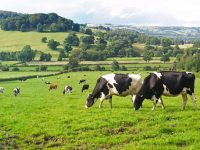COVID-19: Practical guidance for our rural and farming clients #12
Our rural team are the first point of call when client’s financial queries need to be reviewed, addressed, answered and implemented; putting us at the coalface working with those affected by COVID-19.
In the South West, the impact of COVID-19 has presented many of our farming clients with real concerns but also opportunities, so if you want to explore your own business further, increase your confidence in making financial or tax decisions or just talk your ideas through, then please do give us a call.

28th May 2020
-
Andrew Vickery See profile
Statutory Sick Pay (SSP) scheme now open for claims
The Government Statutory Sick Pay scheme launched on 26 May for businesses to recover SSP payments they have made to their employees due to coronavirus. This means eligible businesses can claim and receive repayments at the relevant rate of SSP that they have paid to current or former employees for eligible periods of sickness.
Farmers or rural businesses can claim for an employee who either:
- started self-isolating on or after 13 March 2020 because someone they live with has coronavirus
- has been shielding since 16 April 2020
One exception is that your employee will not qualify if they have been put ‘on furlough’ as of the Coronavirus Job Retention Scheme. There are also further exceptions which can be found here.
It’s also worth noting, you can claim back from both the Coronavirus Job Retention Scheme and the Coronavirus Statutory Sick Pay Rebate Scheme for the same employee but not for the same period of time. Full details on the scheme can be found here.
If you use the Old Mill payroll service then we can claim on your behalf. Otherwise you can make a claim yourself online here.
If all is correct, then you should expect payment into your account within six working days. However, you are asked not to contact HMRC unless it has been more than 10 working days since you made your claim and you haven’t received it or been contacted by them within that time. Again, Old Mill can help make this process easier for you.
Applying for the Bounce Back Scheme? – Record the evidence of how COVID-19 impacted your business
Many of our clients have felt some impact from coronavirus on their businesses, whether this is a drop in commodity prices (milk, meat) to difficulty in sourcing required products (feed, chemicals) and/or maintaining productivity in staff.
It’s difficult to completely define ‘adversely’ in this context but it’s possible that the Government may in the future review all claims for viability and penalise those who can’t evidence the criteria required for claiming.
If you’re considering taking up the Bounce Back Scheme (or indeed, any other Government support scheme) you are welcome to speak to us first to discuss the viability of your claim and we advise that you record the evidence you have to prove your business was adversely affected by COVID-19.
Putting this simple action into place will prepare you to respond and justify any future claims audit that has the potential to arise.
Welcome news for your dealings with large agricultural suppliers
The Coronavirus Large Business Interruption Loan Scheme (CLBILS), which provides Government finance support to mid-sized and larger UK businesses with a group turnover of more than £45 million, earlier this week increased the accepted borrowed from £50 million to £200 million. While most farms in the UK are individually unaffected by this news, many farmers buy from large agricultural businesses who do fall into this category.
The outcome, as such, will give confidence to large scale agricultural suppliers and create a more secure marketplace in terms of supplier stability and guarantee of product.
Discretionary Grants Fund applications now open
The Local Authority Discretionary Grants Fund is now opening for applications across local councils aimed at small businesses who have been adversely affected by the COVID-19 crisis but who didn’t qualify for the Small Business Grant Fund or the Retail, Leisure and Hospitality Fund.
It’s worth noting that businesses who are eligible for the Self-Employed Income Support Scheme (SEISS) are also now eligible to apply for the scheme.
For full details see our article here.
Mortgage holiday extended till 31 October
The mortgage holiday initially put in place to help those in financial difficulty as a result of the COVID-19 outbreak has been extended by the Government for a further three months from the original period – end of June. Along with this, new guidance for lenders and options available to their customers has also been released. Full details can be found on the Financial Conduct Authority website.
Options for repaying the deferred sums include:
- Making a lump sum payment
- Extending the term of the mortgage to maintain the customer’s previous repayment levels
It’s the mortgage firm’s responsibility to give the customer personalised information on the impact of these options on their monthly payments or the term of their mortgage.
Our advice is that a payment holiday may not be the right choice for everyone, and borrowers should only apply if they need one. Please speak first to your adviser at Old Mill if you are concerned about your financial situation.
More details released on the deferral of Self-Assessment payments
As previously reported, self-employed farmers and rural business owners have the option to defer paying their 31 July 2020 tax payment on account, particularly if this relates to a relatively profitable 18/19 financial year before a crisis hit COVID-19 and liquidity of cash has become an issue.
- HMRC will not charge interest or penalties on any amount of the deferred payment on account, provided it’s paid on or before 31 January 2021
- You don’t need to tell HMRC that you are deferring your payment on account
- Choosing to defer will not stop you from being entitled to other coronavirus support that HMRC provide
- You can pay your second payment on account bill in full any time between 31 July 2020 and 31 January 2021 using the online service
- You do need to contact HMRC if you already have overdue tax which you’re paying through a Time to Pay instalment arrangement and want to include your second payment on account in that arrangement
- You can also pay back in instalments between now and 31 January.
However, please do carefully consider the effect of any deferral on your cash flow position in the run up to January 2021. We advise you speak with your Old Mill advisor to discuss the options available for deferral and repayment over the next six months.
Watch it back: Old Mill rural ‘Virtual Breakfast’ Q&A with Director and Rural Adviser, Paul Neate, and Rural Chartered Financial Planner, Stuart Coombe
As usual, last week’s ‘Virtual Breakfast’ contained the updates on COVID-19 support schemes and financial questions asked by our farming and rural business clients. We were also delighted to have an Old Mill financial planner with us to discuss security of savings and investing for the future. We discussed:
- Self-employment support scheme
- Safety of wealth and farmer’s savings
- Bounce Back Loan
- Possible future government taxation
- Key dates of future large payments for farmers
The video, a full rundown of questions posed and timeline of answers can be found here.
Old Mill rural 'Virtual Breakfast' back in two weeks (Friday 5 June)
There will be no breakfast this Friday (29 May) but we will be returning Friday 5 June and will send out joining details in the next rural update. All are welcome to join.
For more information, or if you have any questions about any of the above, please contact your Old Mill adviser or email enquiries@om.uk.

